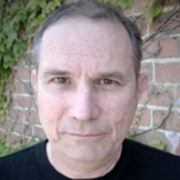
David Coulson
David Coulson's first exposure to the movies came as a young child taken to see Swiss Family Robinson at Auckland's Civic Theatre, with its famous 'sky-at-night' ceiling. He was amazed that the rain outside wasn't falling inside. "Ever since then I have been interested, intoxicated and quite willingly taken to other places by cinema," he says.
Coulson's interest in film didn't immediately manifest itself in his career choice. Intending to study law, he felt unable to mail off the enrolment forms. Instead, in 1974, he took a fledgling 'moving image' course at the School of Fine Art at Canterbury University. Vincent Ward was one of his fellow students.
Seeking a career in film in New Zealand at that time was what he describes as a "gesture of pure optimism". Ground breaking works like Sleeping Dogs, Wild Man and Solo, that helped re-establish the local industry, were still a couple of years away. Even the course itself was subject to the view of some within the university, that film wasn't really a legitimate art form.
Student films were edited on a manually operated Pic Sync, with the budding directors periodically running their work downstairs to project it in real time. Coulson had intended to become a director, but his final year documentary proposal got him three weeks editing at TV2. Watching a trained editor with proper equipment opened his eyes. "I saw for the first time how you could build up stories with pictures. And not only that, you could create arguments, you could create emotions".
In mid-1977 Coulson started with TV One at Avalon as an editing assistant. Work ranged from news editing — sometimes with the emulsion barely set and the bulletin already on air — through to historical epic The Governor, which was shot on negative and edited on work prints with teams of assistants. Factual programmes like Country Calendar were also part of the Avalon mix.
After 18 months he transferred to Auckland to be an assistant on rural police drama Mortimer's Patch. When one of the editors went on maternity leave, he was given the chance to edit a number of episodes (including the number one rating 'Fighting Johnny Fuller') — an opportunity he had expected to wait years for.
By the early 1980s, budget pressures restricted the range and scale of TVNZ's dramas. The broadcaster's editing was nearly all done in-house, but Coulson made another career leap of faith. He and fellow editor Alf West left to open their own cutting room. They picked up independent documentaries, overflow work from TVNZ and offshore productions. In 1982 he cut his first feature film, Geoff Steven's Strata.
A willingness to assist on overseas projects reaped rewards. "Some people will say 'if I'm an editor I don't want to do any assisting' whereas I didn't have that attitude. I was able to hone my systems and cherry-pick good ideas that I saw when I worked in LA or Australia or England."
In 1988, Coulson won Best Editing at the New Zealand Film Awards for Leon Narbey's Illustrious Energy. He worked in England for nine months during 1989, but returned to edit Narbey's The Footstep Man, a rare film whose plotline involves the post-production phase of filmmaking. Coulson was a winner at the 1993 New Zealand Film Awards. The following year he was nominated in three categories — commercial, feature film (Desperate Remedies) and with his winning work on Gregor Nicholas short Pacific 3-2-1-Zero. Further awards followed for editing Nicholas' second feature Broken English, both in New Zealand and at the 1996 Asia Pacific Film Festival.
During the 90s Coulson became a successful commercials editor. This led to work with director Niki Caro, and editing her second feature, Whale Rider. It was a major artistic challenge. "We had to create a credible drama about 20-ton mammals and a little girl, and quite clearly she was never going to be riding a real whale."
The significance of Whale Rider's achievement wasn't immediately obvious; but observing the effect the film was having on people of other nationalities during post-production, "we gradually formed the distinct impression that what we had was something more than a small parochial little New Zealand story".
Coulson was on board for Caro's next project — and another big challenge. North Country was a major studio picture made by Warner Brothers with a $35 million budget, and a star-studded cast that included Charlize Theron, Woody Harrelson and Frances McDormand.
Coulson has continued his association with Caro on three further projects shot partly or wholly overseas: her adaptation of Elizabeth Knox novel The Vintner's Luck, smalltown sports movie McFarland USA, and Caro's movie of non-fiction book The Zookeeper's Wife.
Profile written and researched by Michael Higgins
Sources include
David Coulson
Tracey McCaw, 'David Coulson' (Profile) Art School 125 Website (Canterbury School of Fine Arts). Accessed 26 October 2014
Whale Rider press kit